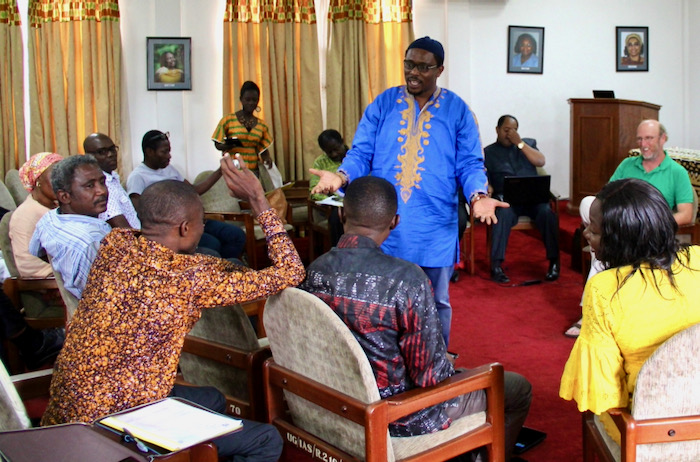The Challenges of Covering Religion in Nigeria

Nigeria, sometimes referred to as the “Giant of Africa” because of its population of 219 million, boasts a diverse tapestry of cultures, languages, and, significantly, religions. There is little doubt religion plays a central role in the lives of most Nigerians.
Reporting on religion in Nigeria, therefore, is a multifaceted challenge, demanding journalists tread carefully to be fair and sensitive. Before offering tips on how to cover religion in Nigeria, here is some background.
The religious demographics of Nigeria
Nigeria primarily consists of three major faiths: Islam, Christianity and indigenous African religions.
Islam: Islam is one of the major religions in Nigeria, with a following estimated at 80-85 million, residing particularly in the northern regions. Islam was introduced to Nigeria as early as the 11th century through trade. Today, Nigeria has one of Africa’s largest Muslim populations, made up of both Sunni and Shia Muslim communities. Key Islamic cities in Nigeria include Kano, Sokoto and Maiduguri.
Christianity: Christianity is also a strong presence, with about 80 million people in Nigeria belonging to various denominations. Christianity is primarily practiced in the southern and central regions. It was introduced during the colonial era by European missionaries. Nigeria has a diverse Christian community that includes various denominations, such as Catholic, Anglican, Pentecostal and others. Lagos and Enugu are prominent Christian cities.
Indigenous African Religions: Before the arrival of Islam and Christianity, Nigeria was home to a variety of indigenous African religions, whose followers today number about 20 million. Their belief systems are rooted in the culture and traditions of various ethnic groups. While the influence of Islam and Christianity has led to the decline of some indigenous practices, they continue to coexist with the two major world religions.
Minority Religions: In addition to the three main religious groups, Nigeria is also home to various minority religions, including Buddhism, Hinduism, and Sikhism. These religions have relatively small but culturally significant communities in the country.
Since Nigeria’s demographics are subject to change from population growth, migration, and social dynamics, the religious spread continues to evolve, reflecting a dynamic, ever-changing society.
Before elections in Nigeria, religious conflicts can emerge, expressed as tensions, discrimination and even violence, primarily between the Muslim and Christian populations. That conflict often winds up in news stories.
Another important source of religion stories in Nigeria is the changing leadership of powerful Pentecostal churches.
Since it can feel daunting when journalists cover religion in Nigeria, this article explains some complexities and offers five tips for reporters seeking to navigate the treacherous waters.
Challenges Covering Religion in Nigeria:
Religious Diversity Nigeria’s religious landscape is incredibly diverse. With the northern region predominantly Muslim, the southwest largely Christian, and various indigenous religions interspersed across the country, journalists must grapple with an array of belief systems and practices.
Sensitivity to Beliefs Religion often encompasses deeply held beliefs, traditions, and practices that can be highly sensitive. Reporting on religious issues without unintentionally offending or causing harm requires a nuanced approach.
Balancing Objectivity Journalists must strike a delicate balance between objectivity and respect for religious sentiments. Presenting information without bias while respecting the cultural and religious context is paramount. Journalists also need to navigate the different interests of media owners, as well as censorship issues.
Access and Trust Building trust within religious communities can be an uphill battle, particularly for journalists perceived as outsiders or from an opposing faith. Establishing relationships with religious leaders and gaining access to events necessitates time and effort.
Avoiding Stereotypes There is a risk of perpetuating stereotypes when covering religion. It is vital to avoid generalizations in storytelling so that reporters paint an accurate picture. As in other parts of Africa and around the world, if reporters reinforce stereotypes then we further validate falsehood rather than solve problems.
Five Tips for Sensitive Coverage in Nigeria:
Deep Research Extensive research is the foundation of responsible reporting on religion. Invest time in understanding the specific religious beliefs, practices, and nuances of the communities you are covering. Informed reporting is more likely to be respectful and, while it costs money to spend more time in research, remains of paramount importance.
Building Trust Building relationships with local religious leaders and community members is key. Trust takes time to cultivate but is essential for gaining insights and access to religious events. Personally, I have covered and reported Islam and Muslim events extensively and I am a Christian.
Avoid Sensationalism Religion can be a deeply emotional and sensitive topic. Avoid sensationalism and respect the privacy and dignity of individuals and communities. Approach stories with empathy and a commitment to responsible journalism.This can be very hard in Nigeria, where major faiths are in a battle for superiority.
Seek Many Voices Seek a diversity of voices in your reporting. Include perspectives from various sources within the religious community to present a well-rounded view. This helps in avoiding biases and ensuring a more accurate representation.
Provide cultural context Recognize that religious practices are often intertwined with cultural traditions. Consider the broader cultural context when reporting on religious issues. Understand how religion influences daily life, customs, and societal norms.
Conclusion
Covering religion in Nigeria is a formidable task, but one that is crucial to fostering understanding among the country’s diverse populace. Journalists have a responsibility to approach this task with care, empathy, and a commitment to fair, even-handed reporting. By adhering to these tips, journalists can navigate the complexities of religious coverage in Nigeria while fostering respect for local cultures and beliefs.
